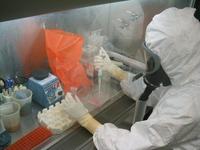-
Expanding the reach of an innovative virus-tracking software
SUPRAMAP is a Web-based application which synthesizes large, diverse datasets so that researchers can better understand the spread of infectious diseases across hosts and geography; researchers have restructured this innovative tracking software to promote even wider use of the program around the world
-
-
Making food, water supply safe is a challenge for today's sensors
Sensors that work flawlessly in laboratory settings may stumble when it comes to performing in real-world conditions; these shortcomings are important as they relate to safeguarding the U.S. food and water supplies
-
-
“Killer silk” kills anthrax and other microbes in minutes
A simple, inexpensive dip-and-dry treatment can convert ordinary silk into a fabric that kills disease-causing bacteria — even the armor-coated spores of microbes like anthrax — in minutes
-
-
Less costly anti-malarial drug
Malaria sickens 300-500 million people, and kills more than one million, annually; scientists are reporting development of a new, higher-yield, two-step, less costly process that may ease supply problems and zigzagging prices for the raw material essential for making the mainstay drug for malaria
-
-
The way one MARSA strain becomes resistant to antibiotic
Researchers have uncovered what makes one particular strain of methicillin-resistant Staphylococcus aureus (MRSA) so proficient at picking up resistance genes, such as the one that makes it resistant to vancomycin, the last line of defense for hospital-acquired infections
-
-
Pandemic 2009 H1N1 vaccination may lead to pan-influenza vaccine
The pandemic 2009 H1N1 vaccine can generate antibodies in vaccinated individuals not only against the H1N1 virus, but also against other influenza virus strains including H5N1 and H3N2; the discovery brings closer the day of a pan-influenza vaccine
-
-
Bacteria's strength in numbers challenged
Scientists have opened the way for more accurate research into new ways to fight dangerous bacterial infections by proving a long-held theory about how bacteria communicate with each other
-
-
Researchers produce potential malarial vaccine from algae
Malaria affects more than 225 million people worldwide in tropical and subtropical regions, resulting in fever, headaches, and in severe cases coma and death; researchers have succeeded in engineering algae to produce potential candidates for a vaccine that would prevent transmission of the parasite that causes malaria
-
-
Malaria detection model wins Georgia Tech Spring Design Expo
Georgia Tech students design of a microfluidic cell sorter that aids in the detection of malaria; no current products exist that can be used for population screening at the desired sensitivity of buyers such as non-governmental organizations, while being both portable and non-electric
-
-
Congress considering biodefense measure

H.R. 2356, the WMD Prevention and Preparedness Act of 2011, will soon be debated before four different House committees, before going to the Senate to be debated further – all this four years after a congressionally mandated commission defined bioterrorism as a grave threat to the United States; critics charge that the reason is the unwieldy and dysfunctional manner in which Congress oversees DHS: currently there are 108 congressional committees and subcommittees with oversight responsibilities for different parts of DHS
-
-
MRSA superbug spreads from big city hospitals to regional health centers
MRSA — methicillin-resistant Staphylococcus aureus — first started to appear around fifty years ago following the introduction of antibiotics, to which the bacteria has become increasingly resistant; scientists now find how the superbug spreads among different hospitals
-
-
Anti-malaria garment drives bugs away

Malaria kills 655,000 people annually in Africa; insecticide-treated nets are commonly used to drive away mosquitoes from African homes, but now there is another solution: a fashionable hooded bodysuit embedded at the molecular level with insecticides for warding off mosquitoes infected with malaria
-
-
Advanced genetic screening to speed vaccine development
Infectious diseases, both old and new, continue to exact a devastating toll, causing some thirteen million fatalities per year around the world; vaccines remain the best line of defense against deadly pathogens and now researchers are using clever functional screening methods to attempt to speed new vaccines into production that are both safer and more potent
-
-
New devices tests food for safety, quality
A new spectrometer will allow consumers to gage the quality of food before they buy it; the device is no bigger than a sugar cube, is inexpensive to manufacture, and could one day be installed in smartphones
-
-
H1N1 discovery paves way for universal flu vaccine
Each year, seasonal influenza causes serious illnesses in three to five million people and 200,000 to 500,000 deaths; university of British Columbia researchers have found a potential way to develop universal flu vaccines and eliminate the need for seasonal flu vaccinations
-
More headlines
The long view
We Ran the C.D.C.: Kennedy Is Endangering Every American’s Health
Nine former leaders of the Centers for Disease Control and Prevention (CDC), who served as directors or acting directors under Republican and Democratic administrations, serving under presidents from Jimmy Carter to Donald Trrump, argue that HHS Secretary Roert F. Kennedy Jr. poses a clear and present danger to the health of Americans. He has placed anti-vaxxers and conspiracy theorists at top HHS positions, and he appears to be guided by a hostility to science and a belief in bizarre, unscientific approaches to public health.
